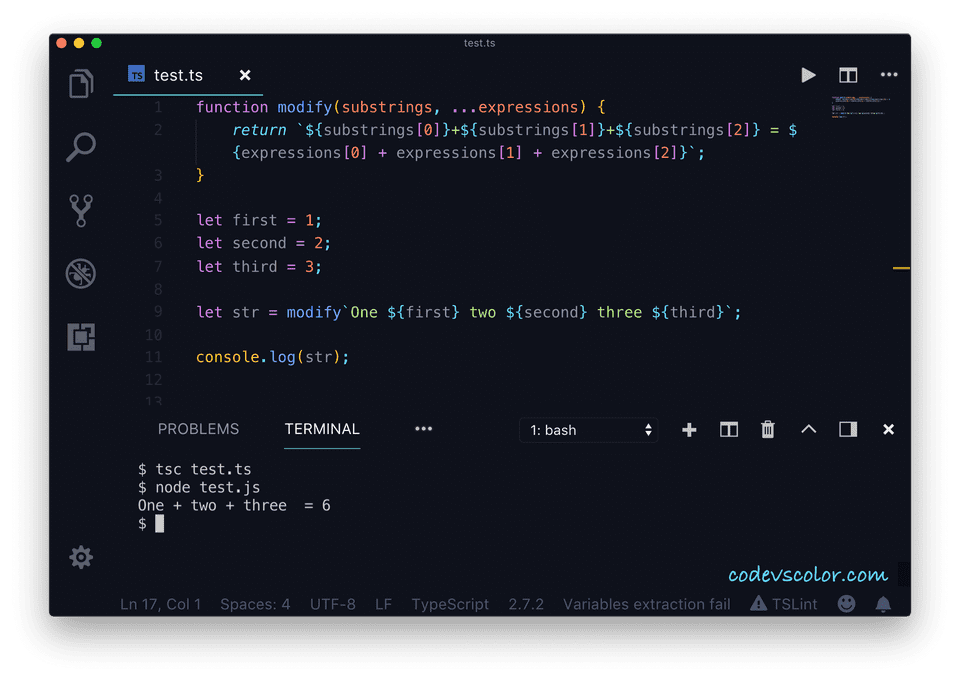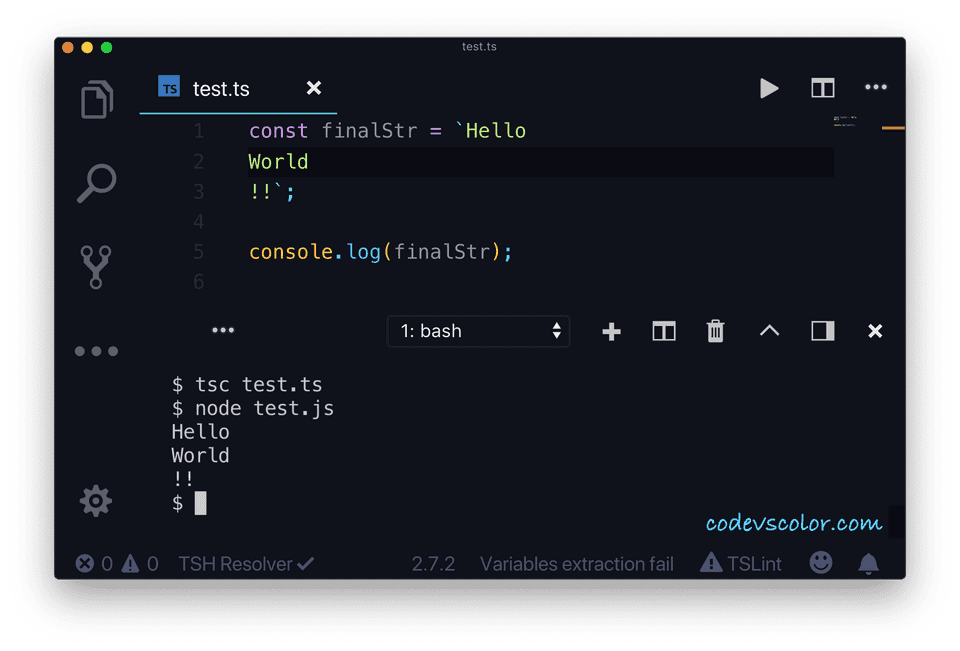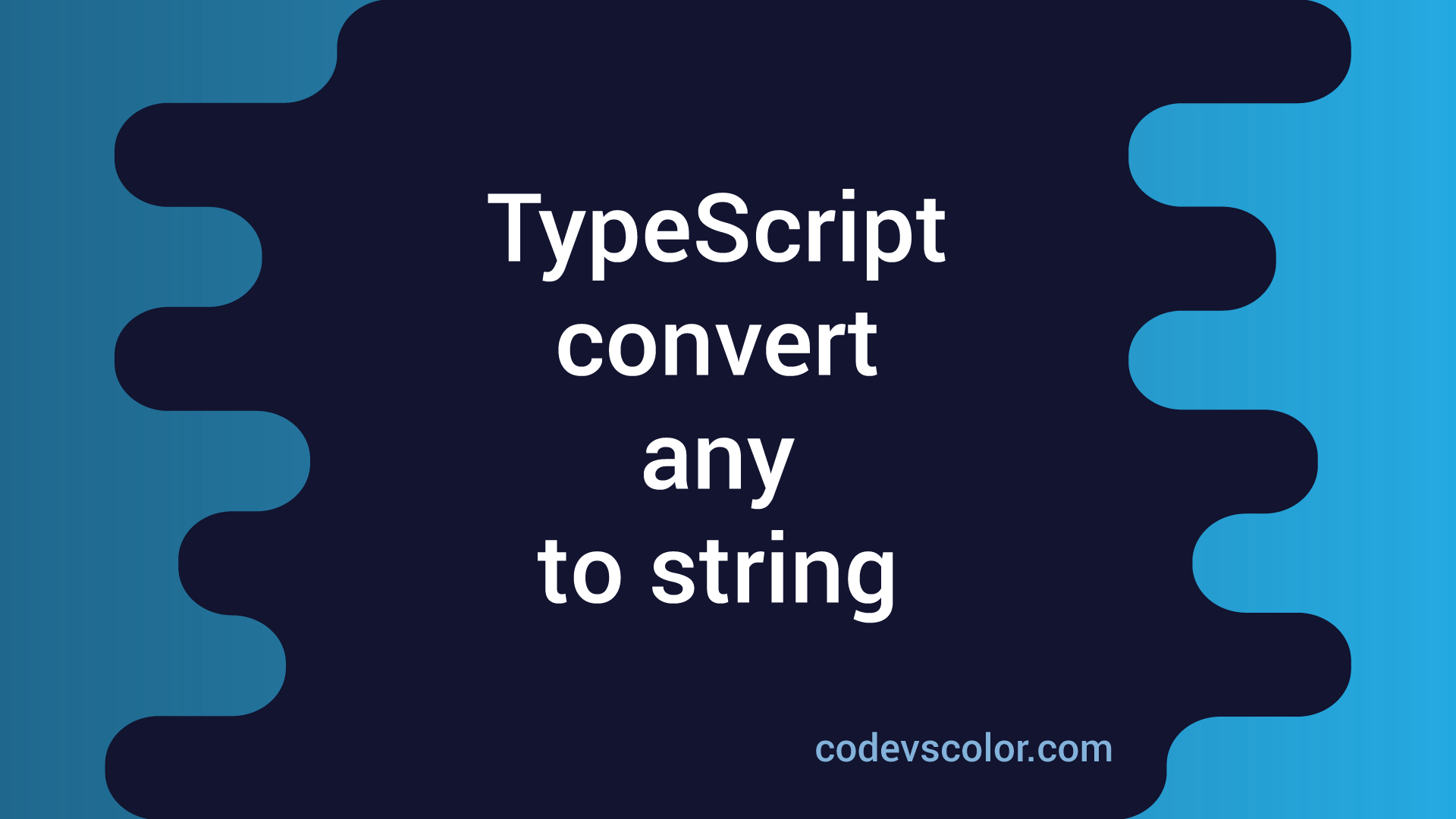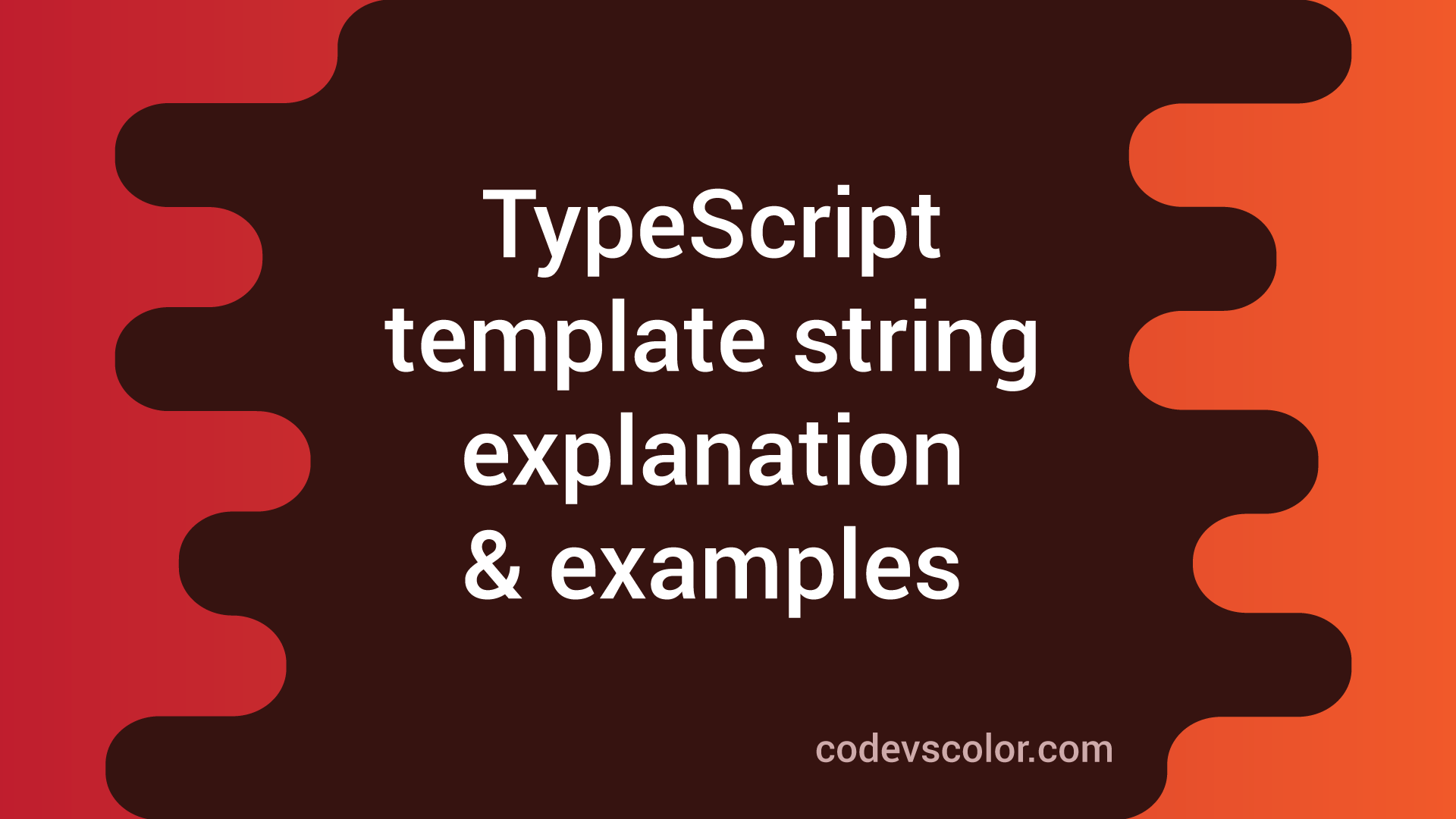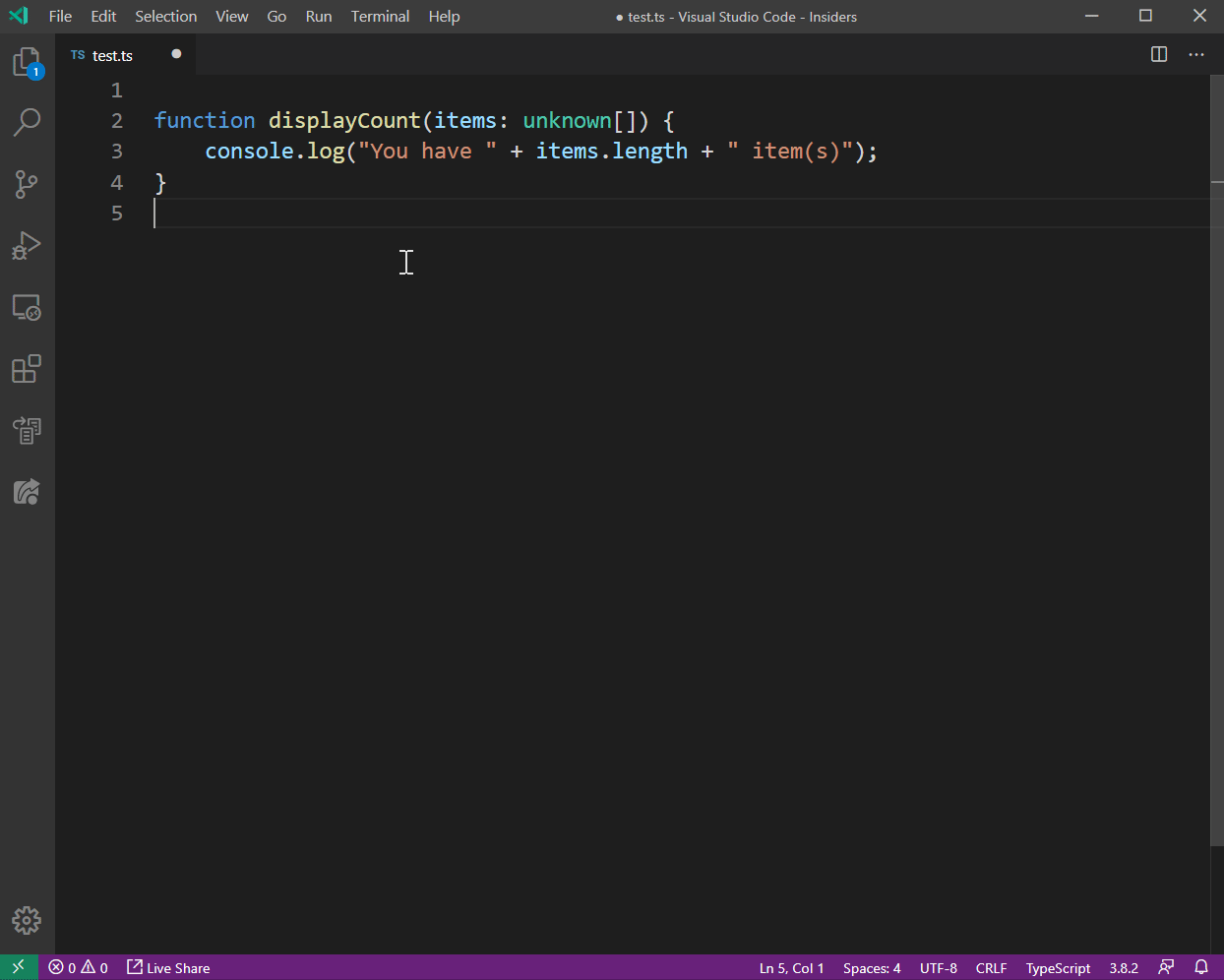Typescript String Templates
Typescript String Templates - In typescript, we can use template strings instead of normal strings. Template literals can be used to extract and manipulate string literal types. Let tpl = `my name is $ {person.name}.`; Web typescript tagged template strings how to use template strings as functions tom • typescript & javascript, coding guides, learning • 10 06 2021 Web basic usage in order to use jsx you must do two things. These string literal types, in turn, can be used as. Web but there’s another place that that string literal types could be used as building blocks: Web 1 answer sorted by: Building other string literal types. $ {.} variable substitutions template literals allow variables in strings:
TypeScript template string examples CodeVsColor
Web string manipulation with template literals. Let tpl = `my name is $ {person.name}.`; That’s why typescript 4.1 brings the template literal. /** @type { { a: Web the typescript tagged templates allow us to tag template strings or template literals using a function (tagged function).
template String in Typescript YouTube
/** @type { { a: Example let firstname = john; Let tpl = `my name is $ {person.name}.`; Web in this section, we’ll explore the type of the functions themselves and how to create generic interfaces. 9 you need to use infer to grab the type from that spot:
TypeScript template string examples CodeVsColor
Web 1 answer sorted by: Strings in typescript are immutable, i.e., values at. Web multiline strings and string interpolation are just great things to have in any language. Web starting with typescript 4.1, it is possible to create types using template string types. Web templates strings have many advantages over standard strings such as string interpolation and embedded expressions.
How to convert any to string in typescript CodeVsColor
This will allow you to create types that check specific string formats and. Web 1 this is a known deficiency in typescript, see microsoft/typescript#13948. /** @type { { a: Template literals can be used to extract and manipulate string literal types. $ {.} variable substitutions template literals allow variables in strings:
TypeScript template string examples CodeVsColor
In simple words, these are strings created using backticks or `. These string literal types, in turn, can be used as. That’s why typescript 4.1 brings the template literal. Web template literal types build on string literal types, and have the ability to expand into many strings via unions. Web multiline strings and string interpolation are just great things to.
13 Angular ES6 TypeScript Template Strings YouTube
Name your files with a.tsx extension enable the jsx option typescript ships with three jsx modes: Web string manipulation with template literals. Web but there’s another place that that string literal types could be used as building blocks: Web starting with typescript 4.1, it is possible to create types using template string types. Let myvar = my name is .
Typescript String Templates YouTube
Let myvar = my name is . Web template literal types build on string literal types, and have the ability to expand into many strings via unions. It's great that you can now use them in your javascript (thanks typescript!). Web typescript tagged template strings how to use template strings as functions tom • typescript & javascript, coding guides, learning.
Announcing TypeScript 3.8 TypeScript
Web starting with typescript 4.1, it is possible to create types using template string types. Web 1 this is a known deficiency in typescript, see microsoft/typescript#13948. Let tpl = `my name is $ {person.name}.`; /** @type { { a: Web the typescript tagged templates allow us to tag template strings or template literals using a function (tagged function).
String Type in TypeScript Typescript Tutorials in Hindi YouTube
Web but there’s another place that that string literal types could be used as building blocks: Web typescript tagged template strings how to use template strings as functions tom • typescript & javascript, coding guides, learning • 10 06 2021 Web string manipulation with template literals. Web templates strings have many advantages over standard strings such as string interpolation and.
javascript Тип TypeScript 'Record ' не может быть назначен типу
It's great that you can now use them in your javascript (thanks typescript!). Let text = `welcome $ {firstname},. Web starting with typescript 4.1, it is possible to create types using template string types. Web the typescript tagged templates allow us to tag template strings or template literals using a function (tagged function). This will allow you to create types.
Name your files with a.tsx extension enable the jsx option typescript ships with three jsx modes: /** @type { { a: Web typescript tagged template strings how to use template strings as functions tom • typescript & javascript, coding guides, learning • 10 06 2021 Web templates strings have many advantages over standard strings such as string interpolation and embedded expressions. Strings in typescript are immutable, i.e., values at. These strings are surrounded by the backtick/backquote ( `) character, and. Let myvar = my name is . Building other string literal types. Web template literal types build on string literal types, and have the ability to expand into many strings via unions. Web the typescript tagged templates allow us to tag template strings or template literals using a function (tagged function). When you use a computed property whose key is not of a single string literal type in an object. In simple words, these are strings created using backticks or `. Web string manipulation with template literals. Web in this section, we’ll explore the type of the functions themselves and how to create generic interfaces. Web basic usage in order to use jsx you must do two things. Type foostring</strong>> = t extends `$ {infer prefix}bar` ? This will allow you to create types that check specific string formats and. Let tpl = `my name is $ {person.name}.`; These string literal types, in turn, can be used as. It's great that you can now use them in your javascript (thanks typescript!).
